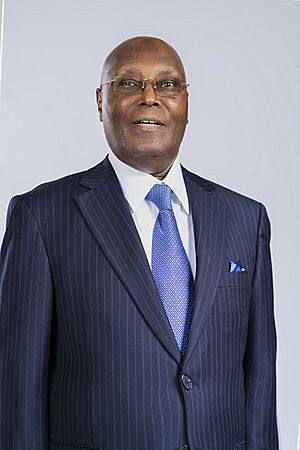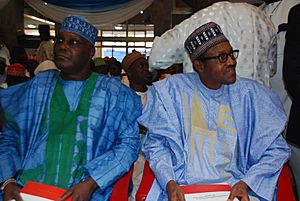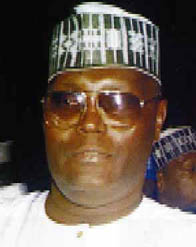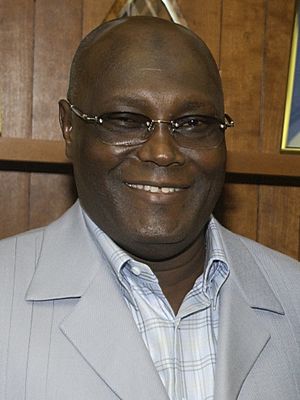Atiku Abubakar facts for kids
Quick facts for kids
Atiku Abubakar
Wazirin Adamawa, GCON
|
|
|---|---|

Abubakar in 2023
|
|
| 11th Vice President of Nigeria | |
| In office 29 May 1999 – 29 May 2007 |
|
| President | Olusegun Obasanjo |
| Preceded by | Mike Akhigbe |
| Succeeded by | Goodluck Jonathan |
| Personal details | |
| Born | 25 November 1946 Jada, British Cameroon (now Jada, Adamawa State, Nigeria) |
| Nationality | Nigerian |
| Political party | African Democratic Congress (since 2025) |
| Other political affiliations |
|
| Spouses |
Titilayo Albert
(m. 1971)Ladi Yakubu
(m. 1979, divorced)Princess Rukaiyatu Mustafa
(m. 1983)Fatima Shettima
(m. 1986)Jennifer Iwenjiora Douglas
(div. 2021) |
| Children | 28 |
| Education | Master of Arts degree in International Relations |
| Alma mater |
|
| Occupation |
|
Atiku Abubakar (born 25 November 1946) is a Nigerian politician and businessman. He served as the Vice President of Nigeria from 1999 to 2007. This was during the time Olusegun Obasanjo was president.
Before becoming Vice President, Abubakar tried to become the governor of Adamawa State in 1990 and 1996. He did not win those times. However, he won the governorship election in 1998. Before he could start as governor, he was chosen to be the running mate for Olusegun Obasanjo. They ran together in the 1999 presidential election and won. They were re-elected in 2003.
Atiku Abubakar has tried to become the President of Nigeria six times. He ran in 1993, 2007, 2011, 2015, 2019, and 2023. In 1993, he ran in the primaries for the Social Democratic Party. He lost to Moshood Abiola. In 2007, he was a candidate for the Action Congress. He came in third place.
He also ran in the primaries for the People's Democratic Party in 2011. He lost to the sitting President Goodluck Jonathan. In 2014, he joined the All Progressives Congress. He ran for president in 2015 but lost to Muhammadu Buhari. In 2017, he went back to the Peoples Democratic Party. He was their presidential candidate in 2019, but again lost to President Muhammadu Buhari.
In May 2022, he was chosen again as the Peoples Democratic Party presidential candidate. This was for the 2023 general election. He won against Nyesom Wike in the party primaries. In the main election, he came in second, losing to Bola Tinubu. Abubakar and other candidates asked for a new election.
In 2025, Abubakar left the PDP. He joined the African Democratic Congress with his former rival, Peter Obi. They plan to work together against the APC in the 2027 presidential elections.
Contents
Early Life and Education
Atiku Abubakar was born on 25 November 1946 in Jada. This village was part of British Cameroons at the time. Later, this area joined with Nigeria in 1961. His father, Garba Abubakar, was a farmer and trader. His mother was Aisha Kande. Atiku was their only child after his sister died young. In 1957, his father died in a river accident.
Childhood and Schooling
At first, Atiku's father did not want him to go to Western schools. When the government found out, his father was briefly jailed. Atiku's mother paid a fine to get him out. At eight years old, Abubakar started at Jada Primary School.
He finished primary school in 1960. Then, he went to Adamawa Provincial Secondary School. He graduated from secondary school in 1965. After that, he briefly studied at the Nigeria Police College. He left because he did not have a required math result.
He then worked as a Tax Officer. In 1966, he went to the School of Hygiene in Kano. He earned a Diploma in 1967. In 1967, he also started studying Law at Ahmadu Bello University. He got a scholarship from the government. After graduating in 1969, he joined the Nigerian Customs Service. In 2021, Abubakar earned a master's degree in International Relations from Anglia Ruskin University.
Working in Customs
Abubakar worked for the Nigerian Customs Service for 20 years. He rose to a high position, becoming a deputy director. He retired in April 1989. After retiring, he focused on his businesses and politics. He had already started a real estate business while working in Customs.
Business Ventures
Starting in Real Estate
In 1974, Abubakar got a loan of 31,000 naira. He used it to build his first house in Yola. He rented out this house. With the money from rent, he bought more land and built another house. He kept doing this and built many properties in Yola.
In 1981, he started a farm. He bought a large piece of land near Yola. He grew maize and cotton. However, this farm did not do well and closed in 1986. After that, he started trading. He bought and sold large amounts of rice, flour, and sugar.
Transportation and Other Businesses
A very important business step for Abubakar happened when he worked at the Apapa Ports. An Italian businessman, Gabrielle Volpi, asked him to help start a logistics company. This company was called Nigeria Container Services (NICOTES). It worked within the ports. NICOTES later became Intels Nigeria Limited. This company brought a lot of wealth to Abubakar.
Abubakar is a co-founder of Intels Nigeria Limited. This company provides services for the oil industry in Nigeria and other countries. Abubakar also has other businesses in Yola, Adamawa. These include Adama Beverages Limited, which makes drinks. He also owns an animal feed factory. He founded the American University of Nigeria (AUN). This was the first American-style private university in Sub-Saharan Africa.
Questions About Business and Government Work
Some people questioned Abubakar's business activities while he was a government worker. They wondered if it was fair for him to own businesses that worked with the government. Abubakar said that he only owned shares in the companies. He stated that government rules allowed this. He also said he was not involved in the daily running of the businesses. His company, NICOTES (later INTELS), was mentioned in accusations of money laundering against Abubakar during his time as Vice President by the U.S. government.
Early Political Journey
Abubakar first got involved in politics in the early 1980s. He worked behind the scenes for Bamanga Tukur's campaign for governor. He helped get votes and gave money to the campaign.
Towards the end of his Customs career, he met General Shehu Musa Yar'Adua. Yar'Adua was a former military leader. Abubakar joined political meetings at Yar'Adua's home. These meetings led to the creation of the People's Front of Nigeria. Many politicians were part of this group.
In 1989, Abubakar was chosen as the National Vice-chairman of the Peoples Front of Nigeria. He also won a seat in the 1989 Constituent Assembly. This group was set up to create a new constitution for Nigeria. The military government did not officially register the People's Front. So, it joined with the government-created Social Democratic Party (SDP).
On 1 September 1990, Abubakar announced he wanted to be governor of Gongola State. A year later, Gongola State was divided into two: Adamawa and Taraba States. Abubakar was now in the new Adamawa State. He won the SDP primaries in November 1991. However, the government stopped him from running in the election.
In 1993, Abubakar ran in the SDP presidential primaries. He came in third place. Moshood Abiola won the primaries. Abubakar was asked to step down from the campaign. Abiola promised to make him his running mate. However, Abiola later chose Baba Gana Kingibe as his running mate for the June 12 presidential election.
After the 1993 election, Abubakar wanted to run for governor of Adamawa State again. This was under the United Nigeria Congress Party. But this plan ended when General Sani Abacha died. In 1998, Abubakar joined the Peoples Democratic Party (PDP). He won the governorship election for Adamawa State in December 1998. But before he could become governor, he accepted an offer. He became the running mate for Olusegun Obasanjo, the PDP presidential candidate. Obasanjo won the 1999 presidential election. This started Nigeria's Fourth Nigerian Republic.
Vice President of Nigeria
First Term in Office
On 29 May 1999, Abubakar became the Vice President of Nigeria. During his first term, he was important in economic matters. He led the National Economic Council. He also headed the National Council on Privatization. This council oversaw the sale of many government-owned businesses that were not doing well.
Second Term and Challenges
Abubakar's second term as Vice President was difficult. He had a strained relationship with President Obasanjo. In 2006, they had a public disagreement. This was mainly because Obasanjo wanted to change the constitution. He wanted to run for president for a third time.
Investigation and Denials
In 2005, there were accusations of wrongdoing involving Abubakar and a U.S. Congressman named William J. Jefferson. An investigation by the FBI suggested that money was meant to influence Abubakar's support for certain business deals in Nigeria.
Jefferson was filmed receiving money. Later, $90,000 was found hidden in his home. Both Abubakar and Jefferson denied doing anything wrong. Abubakar said Jefferson never offered him personal benefits. Jefferson also supported this claim.
In 2009, Jefferson was found guilty of several corruption charges. He was sentenced to 13 years in prison. This was one of the longest sentences for a former U.S. congressman for corruption. However, his sentence was later reduced in 2017.
Disagreement Over Third Term
The disagreement about changing the constitution caused problems within the People's Democratic Party. The National Assembly eventually stopped the changes. This meant Obasanjo could not run for another term. In 2006, Abubakar and President Olusegun Obasanjo had a major falling out. Abubakar then left the Peoples Democratic Party (PDP). He joined the Action Congress of Nigeria (ACN) to prepare for the 2007 elections.
Abubakar said that Obasanjo wanted to stay in power longer. He quoted Obasanjo saying other leaders like Hosni Mubarak and Robert Mugabe had stayed in office for many years. Abubakar told him that Nigeria was different and he must leave.
In March 2014, a group visited Obasanjo. They asked him to forgive Abubakar for any political mistakes. Obasanjo said that as a leader, he held no grudges and had forgiven everyone.
2007 Presidential Election
On 25 November 2006, Abubakar announced he would run for president. On 20 December 2006, he became the presidential candidate for the Action Congress (AC). On 14 March 2007, his name was missing from the final list of candidates. The election commission said he was on a list of people accused of corruption.
Abubakar went to court to challenge this. On 16 April, the Supreme Court ruled that the election commission could not disqualify candidates. This allowed Abubakar to run. On 17 April, the commission confirmed he would be on the ballot. In the election, Abubakar came in third place. He received about 7% of the votes. He said the election was Nigeria's "worst election ever" and asked for it to be cancelled. He did not attend the inauguration of Umaru Musa Yar'Adua.
After Vice Presidency
Returning to the PDP
After the 2007 elections, Abubakar went back to the People's Democratic Party. In October 2010, he said he wanted to run for President again. In January 2011, he ran for the party's presidential ticket. He lost to President Jonathan.
In August 2013, a new political party was registered. It was called the Peoples Democratic Movement. Some thought Abubakar formed it as a backup plan. Abubakar said his "political associates" founded the party. But he stated he remained a member of the PDP.
Joining the All Progressives Congress

On 2 February 2014, Abubakar left the Peoples Democratic Party again. He became a founding member of the All Progressives Congress. He wanted to run for president in the 2015 presidential election. In the APC primaries, he lost to Muhammadu Buhari.
On 24 November 2017, Abubakar announced he was leaving the All Progressives Congress. He returned to the Peoples Democratic Party on 3 December 2017. He said he was "returning home" because the issues that made him leave had been fixed.
2019 Presidential Campaign
In 2018, Abubakar started his presidential campaign. He won the PDP's nomination in October 2018. He defeated other candidates, getting 1,532 votes. He promised to finish abandoned projects in Kogi State. He also said he would privatize 90% of NNPC, Nigeria's main source of income.
On 27 February 2019, Atiku lost the presidential election to President Muhammadu Buhari. He lost by over 3 million votes. He appealed the results at the Supreme Court. He called the election the "worst in Nigeria's democratic history."
2023 Presidential Campaign
Atiku Abubakar became the presidential candidate for the Peoples Democratic Party again in 2023. He won against 12 other candidates in the primary election on 28 May 2022. He received 371 votes. His closest challenger, Nyesom Wike, got 237 votes.
In 2025, Abubakar left the PDP. He said the party had moved away from its original goals.
Personal Life
Abubakar has four wives and 28 children. He explained that he wanted a large family because he felt lonely as a child. He had no brothers or sisters. He did not want his children to feel lonely. This is why he married more than one wife. He sees his wives as his friends and advisers.
In 1971, he secretly married Titilayo Albert in Lagos. Her family was against the marriage at first. His children with her are Fatima, Adamu, Halima, and Aminu. In 1979, he married Ladi Yakubu as his second wife. They have six children: Abba, Atiku, Zainab, Ummi-Hauwa, Maryam, and Rukaiyatu. He later divorced Ladi.
In 1983, he married his third wife, Princess Rukaiyatu. She is the daughter of the Lamido of Adamawa. Their children are Aisha, Hadiza, Aliyu, Asmau, Mustapha, Laila, and Abdulsalam. In 1986, he married his fifth wife, Fatima Shettima. She was his fourth legal wife because he had divorced Ladi. Their children include Amina, Mohammed, twins Ahmed and Shehu, twins Zainab and Aisha, and Hafsat.
In February 2022, Jennifer Douglas confirmed her divorce from Abubakar. She said their marriage ended due to disagreements. One reason was her wish to continue living in the United Kingdom.
Titles and Honours
Traditional Titles
In 1982, Abubakar received the traditional title of Turaki of Adamawa. This title was given by his future father-in-law, Alhaji Aliyu Mustafa. The Turaki title was usually for the monarch's favorite prince. The person holding it was in charge of the monarch's home affairs. In June 2017, Abubakar was given the higher title of Waziri of Adamawa. His old title of Turaki was then given to his son, Aliyu.
International Recognition
In 2011, the National Peace Corps Association (NPCA) honored Abubakar. This was during the 50th anniversary of the US Peace Corps. He received the Harris Wofford Global Citizen Award. The NPCA said Abubakar helped develop higher education in Africa. They stated that no private businessman in Africa had worked harder for democracy or contributed more to higher education. This award came after Abubakar donated $750,000 to the NPCA in 2012. This was the largest individual donation in the Association's history.
See also
 In Spanish: Atiku Abubakar para niños
In Spanish: Atiku Abubakar para niños
 | Toni Morrison |
 | Barack Obama |
 | Martin Luther King Jr. |
 | Ralph Bunche |



